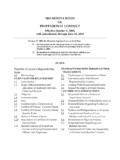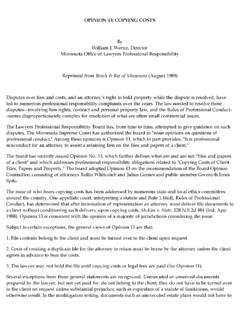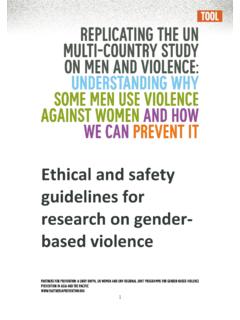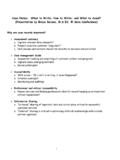Transcription of Contacting Represented Parties: Ethical …
1 Contacting Represented parties : Ethical considerations ByWilliam J. Wernz and Wendy Willson LeggeMinnesota Office of Lawyers Professional Responsibility Reprinted from Minnesota Trial Lawyer (Summer 1991) Rule of the Minnesota Rules of Professional Conduct looks like a very simple rule:In representing a client, a lawyer shall not communicate about the subject of the representationwith a party the lawyer knows to be Represented by another lawyer in the matter, unless thelawyer has the consent of the other lawyer or is authorized by law to do this case, looks are deceiving. This article will explore some of the complicated issues behind thisseemingly simple 1 Corporate EmployeesWhat if the opposing party is a corporation? Can an opposing lawyer talk to employees without permissionfrom corporate counsel? This depends on several factors, including the employee s role within thecorporation and whether the employee is a current employee or a former a lawyer wants to contact a current employee of the opposing corporation (without permission fromcorporate counsel), the lawyer must first know something about the employee s role within the corporatestructure, and about the employee s role in the incident which gave rise to the dispute.
2 The Comment toRule states in part:In the case of an organization, this Rule prohibits communications by a lawyer for one partyconcerning the matter in representation with persons having a managerial responsibility onbehalf of the organization, and with any other person whose act or omission in connection withthat matter may be imputed to the organization for purposes of civil or criminal liability orwhose statement may constitute an admission on the part of the 2 The New York Court of Appeals recently adopted a similar interpretation of the disciplinary rule equivalentto Rule 3 The court interpreted the disciplinary rule to prohibit communication with "corporateemployees whose acts or omissions in the matter under inquiry are binding on the corporation (in effect,the corporation s alter egos ) or imputed to the corporation for purposes of its liability, or employeesimplementing the advice of counsel."Ftn 4 At least one other court has adopted this interpretation of 5A hypothetical example might be useful.
3 Assume that your client Bob was injured when a corporation struck hit Bob near the corporation s loading dock. The truck was driven by a corporate employee, and anumber of other employees on the loading dock witnessed the accident. Bob has sued the corporation andits insurer. Can you talk to the truck driver or any of the employee-witnesses informally, without firstobtaining permission from the corporation s attorney in the matter? Contacting the driver withoutpermission from the corporate attorney would violate Rule , since the corporation may be liable for thedriver s conduct on the basis of respondeat superior. However, you may contact employees who were merelywitnesses, as long as none of them has the kind of managerial responsibilities which would enable them tobind the corporation in the to former employees, the Director s Office has recently changed its position because of a new ABAopinion. Our Office previously applied the same test to former employees as to current employees indetermining whether the employees could be contacted without the permission of corporate 6 The ABA Standing Committee on Ethics and Professional Responsibility, however, has recently opined thatModel Rule (which is identical to the Minnesota rule) does not cover any former corporate employees:Accordingly, it is the opinion of the Committee that a lawyer representing a client in a matteradverse to a corporate party that is Represented by another lawyer may, without violating ModelRule , communicate about the subject of the representation with an unrepresented formeremployee of the corporate party without the consent of the corporation s 7 The Director s Office will follow this ABA course, an employee or former employee of the corporation may have retained individual counsel in thematter.
4 In this situation, an attorney must obtain this counsel s permission before Contacting the employeedirectly. If the employee is individually Represented , then regardless of the employee s position within thecorporation, it is sufficient to obtain the permission of the employee s individual 8 Even if an attorney may contact a corporate employee or former employee without violating Rule , theattorney must be careful not to violate other rules, such as Rules and of the Rules of ProfessionalConduct. If the employee or former employee is personally unrepresented, Rule applies. Rule three requirements in this situation: (1) the lawyer must "clearly disclose whether the client sinterests are adverse to the interests of such person"; (2) the lawyer must make reasonable efforts to correctany misunderstandings which the employee has about the lawyer s role in the matter; and (3) the lawyercannot give advice to the employee, other than the advice to secure counsel.
5 For example, in the truckaccident scenario described previously, assume that the truck driver is now a former employee who ispersonally unrepresented and has not yet been named as a defendant. When you contact the truck driver,you must clearly state that your client might sue the truck driver, and that the driver may be called as awitness adverse to the lawyer must also be careful not to violate Rule , which prohibits a lawyer from, among other things,using "methods of obtaining evidence that violate the legal rights of" a third person. For example, supposethat you wish to contact the former president of a corporation regarding changes in corporate policy. Youmust be careful not to induce the former president to violate the corporation s attorney-client privilege; youcannot ask the former president about his or her conversations with corporate counsel. The attorney-clientprivilege in this situation could be waived only by the corporation, not by a former 9 If youask the former president about conversations with corporate counsel, this would violate Rule because itwould violate the legal rights of the corporation.
6 In light of both Rules and , when you contact theformer president you should tell him or her not to mention anything about conversations orcorrespondence with corporate With Government AgenciesWhat if the opposing party is a government agency? May a lawyer contact any of the agency employeeswithout first obtaining permission from the government s counsel?The Director s Office has interpreted Rule to treat government agencies like any other organization inthis regard. In other words, although Rule prohibits contact with certain government employees havingmanagerial responsibilities or whose conduct is imputed to the agency for purposes of liability, theopposing lawyer would not violate Rule by Contacting other agency permits a lawyer to contact a Represented party directly if the lawyer "is authorized by law to doso." The Comment to the rule states: "Communications authorized by law include, for example, the right ofa party to a controversy with a government agency to speak with government officials about the matter.
7 "The Director s Office has not interpreted this Comment to allow contact with all employees of a governmentagency. This Office has interpreted the authorized-by-law comment to mean that, if there is a specificstatute, rule, case, or other source of law which allows contact with Represented parties that wouldotherwise be prohibited by Rule , then such contact is permitted. This is true in any context, including thecontext of a controversy with a government example, suppose that you represent a landowner in condemnation proceedings brought by agovernment agency. You have corresponded with the government s attorney on this matter. Can youcontact the government agency directly for the purpose of obtaining certain documents? The answerdepends on whom you wish to contact. Ordinarily, you may contact a clerical employee of the agency forthe purpose of obtaining copies of documents generally available to the public. You cannot, however,contact a government employee with managerial authority, such as the person at the agency withsettlement authority in condemnation matters.
8 Although there is a statute which requires the agency toprovide your client with certain documents (Minn. Stat. ), such a statute would not trigger the"authorized by law" exception, because it does not authorize a landowner s attorney to by-pass thegovernment counsel s office in obtaining the documents. By contrast, an example of a court rule whichauthorizes direct contact with an adverse party is Rule of the Rules of Family Court Procedures. Thisrequires orders to show cause and moving papers to be served upon the opposing party personally. Thus,even if the opposing party is Represented by counsel, the rule requires personal InvestigationsDoes Rule prohibit prosecutors from Contacting Represented persons in connection with criminalinvestigations?The leading case in this area is v. Hammad, 858 834 (2d Cir. 1988). Hammad was underinvestigation for medicaid fraud and arson. The Assistant United States Attorney (AUSA) investigating thematter obtained information through an informant who had previously provided Hammad with falseinvoices to bolster fraudulent medicaid claims.
9 The AUSA provided the informant with a sham subpoenawhich purported to require the informant to appear before the grand jury and produce certain records. Theinformant then met with Hammad and showed him the sham subpoena. The meeting was recorded andvideotaped. Hammad spent much of the meeting devising strategies for the informant to avoid compliancewith the subpoena. The AUSA knew that Hammad was at the time Represented by counsel in the trial court suppressed the recordings and videotapes on the ground that the AUSA violated theapplicable disciplinary rule (equivalent to Rule ).On appeal, the Second Circuit held that the disciplinary rule prohibiting contact with Represented partiesapplies to the investigatory stage of a criminal prosecution. The court limited the effect of this holding,however, in its analysis of the "authorized by law" exception to the rule:As we see it, under DR 7-104(A)(1) [the equivalent of Rule ], a prosecutor is authorized bylaw to employ legitimate investigative techniques in conducting or supervising criminalinvestigations, and the use of informants to gather evidence against a suspect will frequently fallwithin the ambit of such at 839.
10 The court held, however, that the AUSA in Hammad did violate the rule. Specifically, by issuingthe sham subpoena, the prosecutor went beyond legitimate investigative techniques, and the use of thissham subpoena "contributed to the informant s becoming the alter ego of the prosecutor." Despite the ruleviolation, the Second Circuit held that the district court had abused its discretion in suppressing therecordings and videotapes, since prior to this decision the applicability of the rule to criminal investigationshad been 10In response to Hammad, United States Attorney General Thornburgh issued a memorandum dated June 8,1989, which takes the position that criminal and civil law enforcement officers, including Justice Departmentattorneys, are exempt from the requirements of Rule There has been considerable negative reaction tothis memorandum. For example, the ABA adopted a resolution opposing any attempt by the Department ofJustice to exempt its lawyers from Model Rule 11.















